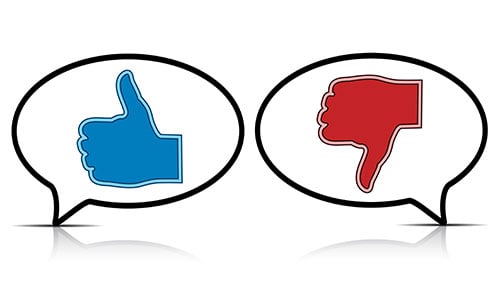
In this election year, as emotions are running high, think twice before you post, or tweet, or like as your online reputation may be up for vote next
Ahhh, election year. Blue states, red states, purple states. We’re all well versed in delegates and the Electoral College; we’ve watched the debates and we have very clear opinions about who’s running.
But before you tweet or post a funny political meme, better think twice. Chances are good, there are just as many people in your social network who disagree with you as much as agree with you.
And one of them might be your boss.
Sex, Religion, Politics
There’s an old saying that never gets old: There are three things you should never talk about: Sex, religion and politics. What was true for a 1960s dinner table is the same 50 years later online.
Take a look at your list of friends online. Chances are good that the list includes family members, old classmates, current friends, those friends you haven’t seen in five years but would feel guilty for unfriending, coworkers and — let’s be honest — a frenemy or two.
Maybe you’re the kind of person who likes confrontation, but publicly posting political thoughts could compromise your relationships and maybe even your job.
Really.
Staying Friendly
People are passionate about their political beliefs. And thanks to social media, it feels like this election cycle is particularly heated. Candidates are tweeting, as are their surrogates, and every statement is likely to either inspire or aggravate you.
But before you post a rant, consider how it might affect your relationships — even with those folks you don’t talk to. Many people’s political beliefs go to the core of their moral compass. You could be insulting their very essence.
If you must post, think about a way to phrase your beliefs so they’re not as inflammatory — encourage everyone to vote, even those who don’t share your views. Link to reputable news sources, rather than those that have an obvious political slant.
And think about the ramifications of what you post.
Professional Quandaries
You absolutely have the right to your opinions, but they could start to harm your career. Many companies have explicit social media policies that outline what is appropriate speech. If you openly state who your employer is online, your political speech could be interpreted as that of your employer. Read your company handbook to find out if there’s a policy, and how you should follow it.
Are you friends with your boss online? (It’s OK. A lot of us are.) Tread lightly when discussing politics online, particularly if your supervisor has conflicting opinions. It’s always wise to operate on common ground.
But your future job is of more concern than your current one. When you apply for a job, you can almost be certain that a prospective employer will scour social media to learn about you. Quickly, your likes and dislikes will become apparent, as will your professionalism, sense of humor, and discretion. Just like an unflattering photo of you years ago at a frat party in college can cast the wrong impression, so too can a rant about a political figure.
Dos and Don’ts
While you absolutely have the right to exercise free speech, the reality is that free speech can sometimes make life uncomfortable.
When it comes to social media during a political year, weigh your options and try to follow these rules. They might help to preserve your stellar reputation.
Do:
- Encourage people to vote
- Declare your interest in issues
- Link to reliable news sources
Don’t:
- Insult the “opposition”
- Get into arguments
